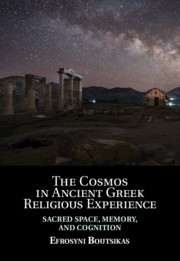Book contents
- The Cosmos in Ancient Greek Religious Experience
- The Cosmos in Ancient Greek Religious Experience
- Copyright page
- Dedication
- Contents
- Illustrations
- Graphs
- Tables
- Acknowledgements
- One Introduction
- Two Methodological Advances, Approaches, and Considerations
- Three Worship in Space and Time
- Four Astronomy and Perceptual Cognition in Apolline Cults
- Five The Cosmos in Manifestations of Identity, Memory, and Remembrance
- Six Cosmic Time in Greek Mystery Cults
- Seven Epilogue
- Appendix
- Glossary
- Notes
- References
- Index
- Plate Section (PDF Only)
One - Introduction
Published online by Cambridge University Press: 04 November 2020
- The Cosmos in Ancient Greek Religious Experience
- The Cosmos in Ancient Greek Religious Experience
- Copyright page
- Dedication
- Contents
- Illustrations
- Graphs
- Tables
- Acknowledgements
- One Introduction
- Two Methodological Advances, Approaches, and Considerations
- Three Worship in Space and Time
- Four Astronomy and Perceptual Cognition in Apolline Cults
- Five The Cosmos in Manifestations of Identity, Memory, and Remembrance
- Six Cosmic Time in Greek Mystery Cults
- Seven Epilogue
- Appendix
- Glossary
- Notes
- References
- Index
- Plate Section (PDF Only)
Summary
Unthinkable as it may be for most modern city-dwellers, one glimpse of a truly dark night sky is simply captivating. Our daily immersion in light-polluted, densely constructed cities has resulted in our detachment from the night sky and open horizon views. This detachment has inevitably also influenced the way we approach ancient cultures the world over. Because we do not think of the night sky, we assume the ancients did not either. And although much has been written and theorised about ancient landscapes, space, and movement, such studies almost exclusively concern these concepts as experienced in the light of day, bypassing in this way a significant portion of ancient lives and experience. In our scholarly endeavours, we forget that darkness and light amplify in different ways the experience, perception, and impression of a place or event, optically altering colours, textures, figures, spaces, landscapes, and structures.1 The effect that pockets of artificial light in dark spaces have of tightening participants’ physical proximity during nocturnal performances, for example, has been demonstrated in recent research in cultural geography. Such use of light not only brings people physically closer, but naturally also affects experience.2 In modern theoretical and empirical studies of the Classical (and particularly the Greek) world, though, investigations engaging with ritual experience and spatial movement tend to assume seasonless, diurnal conditions, despite recent efforts to stress the inseparability of time and space – in other words, the importance of the chronotope3 – in human cognition, experience, and memory. And in this way, we so effortlessly bypass approximately half of the daily twenty-four-hour cycle and, consequently, a significant portion of human experience, encounters, memories, and interpretations.4 In other disciplines, work on nightscapes has emerged as an awakening of what we have been so far leaving out in relation to embodied practice and affect.5 Yet the study of the Classical world stubbornly resists.
- Type
- Chapter
- Information
- The Cosmos in Ancient Greek Religious ExperienceSacred Space, Memory, and Cognition, pp. 1 - 12Publisher: Cambridge University PressPrint publication year: 2020

